This outline is the first for a series of sermons on “seasons of life.” Most of it is taken, shamelessly, from Jim Jordan’s wonderful study, From Bread to Wine , and from other things I have learned from Jim over many years.
Galatians 4:1-11
INTRODUCTION
The Old Testament is the story of the birth, infancy, and youth of the people of God. Yahweh directed and guided Israel toward maturity, and in doing so revealed both His methods for guiding us to maturity and His pattern for us to guide our children toward adulthood.
THE TEXT
?Now I say to you that the heir, as long as he is a child, does not differ at all from a slave, though he is master of all, but is under guardians and stewards until the time appointed by the father . . . .?E(Galatians 4:1-11).
FROM SLAVES TO SONS
In Galatians 3-4, Paul is explaining how the Law fits into God?s program for fulfilling the promise. God promised Abraham that ?all nations shall be blessed in you?E(3:8) and this promise was made to Abraham?s ?seed?E(3:15-16). The Law that came centuries later did not cancel this promise, but was a mechanism for fulfilling that promise.
Paul describes how the Law functions by drawing an analogy between the way God dealt with Israel and the way a father deals with a son during his childhood. The Law was given as a ?tutor?Eto lead to Christ (3:23-24). Paul does not mean that the preaching of the Law convicts us of sin and drives us to trust in Jesus for salvation, though that is true. He is talking about the progress of history: The Law provided structure and guidance for Israel ?until faith came,?Ebut now that faith has come we no longer have need for that tutor. Paul uses a similar image in chapter 4. The Law was like ?guardians and managers?Ethat oversee a young child (4:1-2), but once the child has grown up he no longer needs the oversight of these guardians.
At the end of this passage, Paul warns very strongly against reverting to the earlier, immature, phase of life. To go back under the law, with its restrictions about food and touching, with its submission to new moons, is to revert to childhood. It would be like a teenager deciding he wants to wear diapers again. In short, Paul explicitly describes redemptive history as God?s parental oversight of Israel.
PRIEST, KING, PROPHET
To fill this out, we can summarize the stages of Yahweh?s guidance of Israel using the threefold office of Jesus. Jesus is the priest (Hebrews 7), the king (Romans 1:1-4), and the prophet (Luke 9:16). Though Jesus holds these offices simultaneously and completely, they can also serve as a template for understanding the maturation of Israel under the Old Testament. The phases overlap and each builds on the previous stage, but there is a progression from a priestly to a royal to a prophetic Israel.
The Mosaic system marked the priestly stage of Israel?s history. When Yahweh met with them at Sinai, He said He was establishing them as a ?kingdom of priests and a holy nation?E(Exodus 19:6). What was new in this phase of Israel?s history was the tabernacle; Israel had been God?s chosen people in the past, but had not been the nation of ?house-keepers.?E Leviticus, with its laws of sacrifice, holiness, cleanness and uncleanness, is at the heart of the Torah, and the High Priest was the person who represented the people.
When David rose to power in Israel, God established a new order of things, a covenant in which kingship was highlighted. The new thing in this phase of Israel?s history was a permanent monarchy; prior to this period, political leaders had arisen in Israel on an ad hoc basis (cf. Judges). When Yahweh established His covenant with David, David?s descendants became the representatives of the whole nation (2 Samuel 7).
Soon, of course, the Davidic kingdom split and without a few centuries Israel was no longer an independent kingdom. At the time of the Babylonian exile, the Davidic monarchy came to an end, and was never reestablished. Davidic figures like Zerrubabel were leaders of Israel, but no Davidic scion came to the throne of David until Jesus. During the exilic and postexilic phase of Israel?s history, leadership was provided mainly by prophets. Priests still led worship in the temple, and there were political leaders, but the most prominent figures were prophets like Isaiah, Jeremiah, Ezekiel, Daniel, Haggai, and Zechariah.
Each transition in the history of Israel was marked by crisis. The Mosaic order collapsed after the battle of Aphek (1 Samuel 4-6), and after decades of confusion the Davidic order took its place. The Davidic monarchy ended with the exile, and only seventy years later did a new order return. Each transition is marked by death and resurrection.
BIOGRAPHY AND HISTORY
Yahweh?s work with Israel shows us the pattern He uses to direct His people to maturity. Our individual lives follow, in a rough but genuine way, the pattern of Israel?s history: We are called to move from priestly to kingly to prophetic phases of life. And as parents we are to direct our children through the same phases.
When we apply the pattern of priest, king, and prophet to our lives, we cannot apply it in a direct fashion. It is not as if everyone of us started out with an ?office?Eof priest, and then later takes on a crown as a king and still later begins to predict the future. The point is more general: Priests are essentially servants of a ruler, and are bound by strict and detailed laws. Kings are rulers themselves, and have to rule by wisdom. Prophets are members of God?s council, and have the maturity both to deliver the word of God to people and to bring petitions before God. Someone who is truly prophetic is able to set the world in a new direction by the sheer power of his words.
These patterns may vary. A man may spend his entire life in a ?priestly?Ecapacity, faithfully serving; some are more gifted in serving than in ruling.
CONCLUSION
The Bible points to three sinful responses to this process of maturing. The first is resistance to maturity. We are called to grow, both individually and corporately.
The second sin is the opposite: attempting to seize opportunities, privileges, or positions of authority before they are given to us. Throughout Scripture, patient endurance and submission is the path to advancement. As Solomon said, there is a time for everything under the sun.
Finally, the Bible shows us that it is possible to move through these phases sinfully. Instead of serving as priests, we rebel and refuse to obey the rules. As a result, we do not rule wisely when we are given responsibility. When we become old, we are bitter and resentful, rather than a source of wisdom for others.
Catechism for Little Saints
What offices does Jesus have?
Jesus is priest, king, and prophet.
How did God raise His Son Israel?
He first made Israel a priestly nation, then gave them a king, and then brought them prophets.
How does this apply to our lives?
First we must learn to serve, according to strict rules; then we learn to rule, and exercise wisdom; finally, we are equipped to teach others, and to give advice to God.











